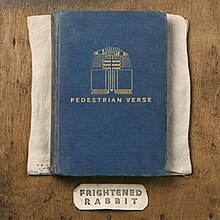
Pedestrian Verse – Frightened Rabbit
Scott Hutchison is both gifted and wordy; his wordiness is,
in fact, his chief gift. His secondary
gift (and here the ungifted could be pardoned for wondering: why does he get two?) is a uniquely plaintive/wounded voice that gloriously manages
to render the entire concept of “emo” both dated and silly.
Which I think tends to crate his band Frightened Rabbit into
a bit of a cramped confine.
There is,
evidence to the contrary found to be lacking, really no good way to be both wordy and
plaintive in a faster-paced song without sounding rushed or contrived. (There.
Wrote it. The most accomplished
band since 2008 has an intrinsic tendency toward structural error and
contrivance. Evinced by the album The Winter of Mixed Drinks. And the weight lifts.)
When Hutchison is given song space to really sing it, to process and relate the notes
and words of his evidently sizable accumulated personal damage, the results
(“Modern Leper,” “Keep Yourself Warm,” “Swim Until You Can’t See Land,” “Fuck
This Place,”) are Galapagos-caliber unique and spectacular: really, no one else makes music anything like
this. It is crooning without discernable
pride; funny and fun; perfect art without a trace of sly self-regard.
This new album slouches into perfect form with lolling
opener “Acts of Man,” all wisecracks about porn and hitting on your girlfriend,
and the borderline-brilliant grammatical inversion of “not here: heroic acts of man” to constitute the fucking chorus. And later, the checkmate substitute chorus,
“I’m here: not heroic, but I try.” Ah, yes.
Clever Disdain, my old friend: we
meet again.
And then come songs like “Holy” and “The Woodpile” on Pedestrian Verse. The music is really fine. Better than fine, actually. And the lyrics are clever and actually pretty
great. But the sum effect is much less
than the value of the parts, and I tend to think that the issue in multiple
places is the lack of space for so many pained words. Afflictions, be they wounds or illnesses,
require therapeutic space. And
rest. Maybe a concert full of 25
mid-to-slow-pace songs would be a downer.
But maybe the band should let go of that concern a little bit more than
they have.
The contrast between hurried and unhurried becomes
gloriously clear on follow up tracks “Late March, Death March,” and “December’s
Traditions,” in which the music, while forceful, is just slow enough to allow
the breaths and punctuation necessary to elevate the entire thing to the strata
of “Only Frightened Rabbit are this type of great.” The tracks are clever and well-played, and in
places they both actually do hustle; but they also relax when relaxation is
called for.
And then we arrive at “Dead Now” and “Nitrous Gas,” which, while
both being pretty overtly about the horror of death-as-coping technique, are (now,
the inappropriate laughter of Surprise Joy on the Subject of Death) another
pair of shimmering decorations on FR’s uniform of accomplishment. On the former, a softly-shuffling-across-hardwood
percussion line eventually builds into gorgeous instrumentation, and then the
subsequent isolation of Hutchison’s voice noting, a few times, “There is
something wrong with me.” The band
cobble together a beautiful collection of instruments and sounds over the first
2.5 minutes of the song, then peel almost all of it back to his naked worry/a
piano/a pair of drumsticks, and then draw up the sails again for the glorious
post-crisis, post-catharsis celebration.
It is an epic in a bottle.
“Nitrous Gas” might actually be the stronger of
the two tracks, and therefore the best song on this very strong album. Not to rub it in, but the tempo: deliberate.
The voice: perfect. The melody and instrumentation: sublime.
This ranks with a handful of The
Midnight Organ Fight songs and “Swim Until You Can’t See Land,” as one of
the band’s most fully realized songs.
Like so many of their other classics, it is sadder than sad, but my
guess is that even the saddest listeners are going to be driven to smiles by
the beauty of what they are hearing. Our
sadness feels like pretend sadness, or maybe amateur sadness, when considered
up against the profile of this edifice:
1) “I’m dying to tell you that I’m dying
here.”
2)
“Go where the joyless bastard lives—he’s dying
to bring you down with him.”
3)
The introductory guitar line, which rivals the
Weakerthans’ “Left and Leaving” intro guitar as the most focusing-yet-destabilizing
leadoff guitar notes basically ever.
I am a fatally-flawed sucker for a choral effect, and this
song has one of those, too. And it is, unsurprisingly, beautiful.
The Weakerthans parallels continue in album-closer “The Oil
Slick,” which comes delightfully close to jauntiness. There is a sheepish grin embedded in the
words “oil slick” —it is strangely fun to say (and, we assume, sing,) for being
an image of such ultimately nasty impact.
The light-hearted melody reinforces the bathos here; the wildlife sounds
in the background during the final fade-out further, um, muddy the water.
(Additional random positive notations: Hutchison is probably the best singer of
profanity currently practicing his trade.
It is no accident that he belted out six “fuckings” in Organ Fight’s “Keep Yourself Warm,” and
there is another doozy in “December’s Traditions.”)
(Additionally, this review chooses not to wade into another
fawning paragraph, this hypothetical one about the song “State Hospital,” which
was released as part of an EP of the same title a few months ago and is
included on this album as well. The song
is the equal of the best songs noted above. But not here: another fawning sentence about this album.)
Keepers: 1, 2, 3, 4,
5, 6, 8, 9, 10, 11, 12
February 2013